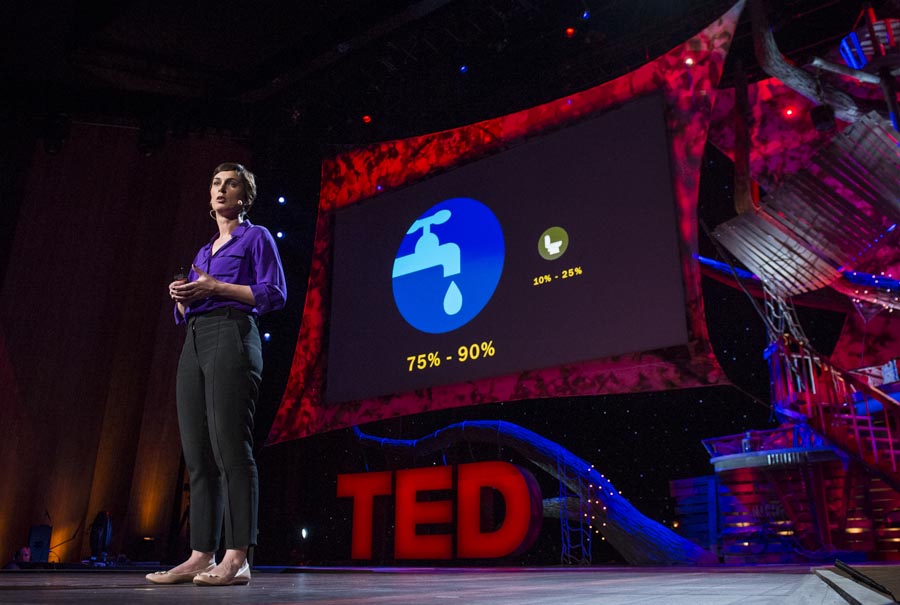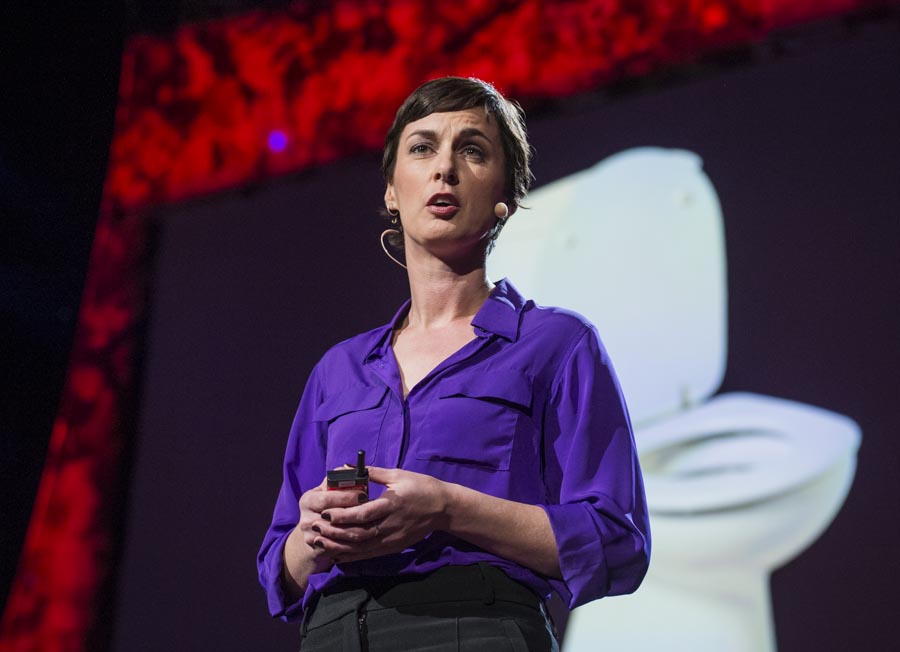A trip to a public bathroom stall several years ago inspired journalist Rose George to think.
“I asked myself the question: Where does this stuff go?” George remembers. “With this question, I found myself plunged into the world of sanitation, toilets and poop. And I have yet to emerge.”
Many people don’t think much about toilets. As she suggests during Session 9 of TED2013, we think of a toilet as a right, not a privilege. But more than 2.5 billion people worldwide don’t have access to a toilet — that’s 40% of world. Instead, large tracts of the world’s population relies on open defecation: pooping by the side of the road.
The problem with this system is that poop can carry 50 communicable diseases — a typical amount is 1,000 parasite cysts, 1 million bacteria, 10 million viruses and 100 worm eggs. Fecal particles on hands lead to the contamination of food and homes, leading to disease. In our culture, we joke about diarrhea — but this illness kills 4,000 children every day. And even though it is the second biggest killer of children worldwide, diarrhea gets a fraction of the funding of other diseases.
The solution, of course, is the toilet. When created in the mid-19th century and installed en masse in London, child mortality dropped by the most it ever had in history. The toilet may be one reason the human lifespan has increased so dramatically. Says George, the author of The Big Necessity: The Unmentionable World of Human Waste and Why It Matters, “I think [the toilet is] so good — it doesn’t smell, we can lock it behind a door, keep it in our homes — that we’ve locked it out of conversation.”
 In both developing and developed countries, 75% to 90% of health and sanitation budgets goes to clean water. And only 10 to 25% goes to toilets. All of this is sad because fecal matter can actually be used for good. If feces is put into a sealed environment, it gives off gas — gas that can be safely harnessed, even for cooking. George gives the example of a prison in Rwanda, where 75% of the cooking fuel comes from the prisoner’s poop.
In both developing and developed countries, 75% to 90% of health and sanitation budgets goes to clean water. And only 10 to 25% goes to toilets. All of this is sad because fecal matter can actually be used for good. If feces is put into a sealed environment, it gives off gas — gas that can be safely harnessed, even for cooking. George gives the example of a prison in Rwanda, where 75% of the cooking fuel comes from the prisoner’s poop.
So how do we get more attention for the issue of toilets and sanitation?
“We need to understand human psychology,” says George. Old habits die hard. Even when latrines are given out freely, in many parts of the world, many people opt not to use them, and walk right by to use the familiar bathroom outdoors. But she notes a strategy that might be able to change this. “In the early 19th century, they tried selling soap as healthy. No one bought it. They tried selling it as sexy, and everyone bought it.” She points to a campaign in India to convince young women not to marry into homes without a toilet. Think of it as “No loo, no I Do.”
George sees a lot of promise in the example of Japan; 70 years ago, it was a country that relied on pit latrines. Now they have the world’s most deluxe toilets — ones with heated seats and automatically lowering lids.
“They brought the toilet out from behind the locked door. They made it a conversation piece. People now go out and upgrade their toilets,” says George. “So I ask you for one thing: please go home, speak about the unspeakable and talk shit.”
Rose George’s talk is now available for viewing. Watch it here»

Comments (4)
Pingback: Reinvent the Toilet Challenge Debuts in China -with 5 M$ from Gates Foundation | Washlink
Pingback: Rose George: Take toilets seriously talk at TED@London | Washlink
Pingback: Rose George » Blog Archive » Ted2013
Pingback: East Street Arts – Leeds » Rose George “talks shit” at TED